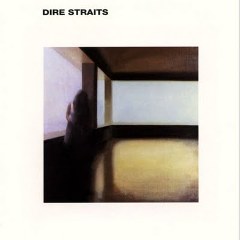Dire Straits - Love Over Gold (1982)
Dire Straits - Love Over Gold (1982)

1.Telegraph Road 14:20
2.Private Investigations 7:00
3.Industrial Disease 5:50
4.Love Over Gold 6:15
5.It Never Rains 7:55
Musicians:
Mark Knopfler – guitar, vocals
Alan Clark – organ, piano, synthesizer
John Illsley – bass
Hal Lindes – rhythm guitar
Pick Withers – drums
+
Mike Mainieri – marimba, vibraphone on 2 and 4
Ed Walsh – synthesizer
Love Over Gold is not just the title of Dire Straits' fourth album, it is a statement of purpose. In almost suicidal defiance of commercial good sense, singer-songwriter-guitarist Mark Knopfler has chosen to follow his muse, fashioning a collection of radically expanded epics and evocative tone poems that demand the listener's undivided attention. Certainly a quantum leap from the organic R&B impressionism of the band's early LPs (Dire Straits and Communique) and the gripping short stories of Making Movies, its 1980 best seller, Love Over Gold is an ambitious, sometimes difficult record that is exhilarating in its successes and, at the very least, fascinating in its indulgences.
Two drastically different moods dominate the new album. One is sharp and fiery (like the bolt of lightning on the cover); the other is soft and seductive. That dichotomy is particularly explicit in "Private Investigations," a long, unorthodox ballad in which Knopfler plays a private detective hardened by a life of combing through other people's dirty laundry. Over a discreet synthesizer ring, gurgling marimba and a delicately plucked acoustic guitar, he grumbles into his whiskey glass like Bob Dylan in a trench coat: "You get to meet all sorts in this line of work Treachery and treason There's always an excuse for it," he recites in a raspy nicotine snarl. Then John Illsley sounds a quiet warning with a stalking bass line before the song erupts in dramatic bursts of guitar gunfire and tragic-sounding piano playing.
This wracking schizophrenia between the heart and the heartless, the loving and the pain, has always informed Knopfler's songs and arrangements. Love Over Gold, however, finds Knopfler casting further than ever for ways to articulate the frustrations that color his romantic streak. At nearly fifteen minutes, the album's opener, "Telegraph Road," is certainly a challenge to the average pop fan's attention span. But the song's historic sweep and intimate tension — the building of America and the dashing of one man's dreams in the wake of its accelerating crumble — enable Knopfler to deploy a variety of surprising instrumental voices, from the synthesized sunrise whistle at the beginning to the baroque piano motif in the middle. The song closes with an extended solo guitar crescendo that's heated up by Pick Withers' galloping drums. "Love Over Gold" is a whispery ballad that plays the jazzy tingle of vibes against an almost classical piano air and the violinlike pluck of a synthesizer to heighten its images of a casual, even cavalier, sex life. On the other hand, "Industrial Disease" — at five minutes, the shortest of the LP's five songs and its most conventional rocker — crackles with a cynicism underlined by its cheesy "Wooly Bully" organ and coughing guitar effect.
At times, Mark Knopfler, who also plays producer here, seems to try too hard. "It Never Rains" is a harsh chip off the "Like a Rolling Stone" block. And nearly all the songs end in guitar solos, as if he had too many ideas and was unsure how to reconcile them. But in a period when most pop music is conceived purely as product, Love Over Gold dares to put art before airplay. ---David Fricke, rollingstone.com
download (mp3 @224 kbs):
yandex mediafire 4shared uloz.to cloudmailru gett
Last Updated (Thursday, 25 January 2018 22:04)








